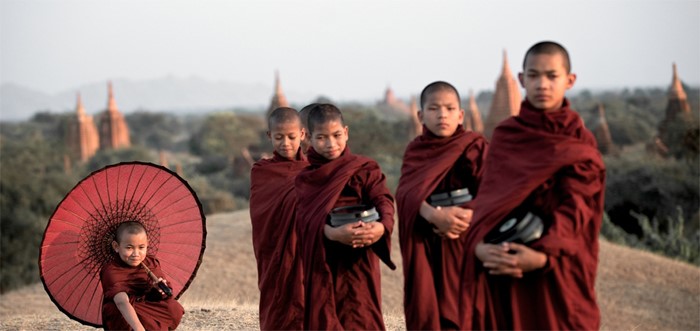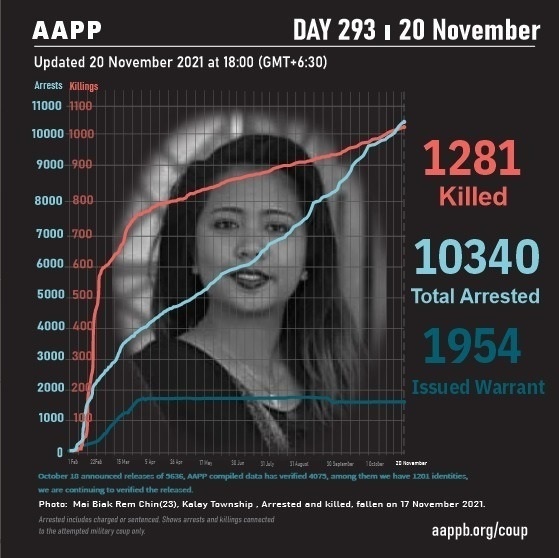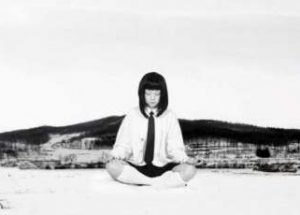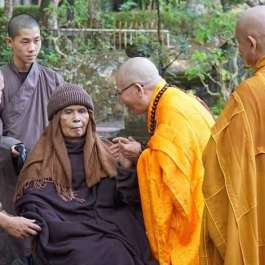
Religious groups in strife-torn Myanmar say that they are increasingly being targeted in government suppression efforts, amid growing public opposition to the military junta that seized control of the government in February. Leaders from the country’s religious communities have reported feeling the impact of active persecution by military and police forces.
In a recent report, VOA News cited human rights activist Thet Swe Win, founder of the Myanmar interfaith organization Synergy as stating that several religious groups had been targeted by the military, including Buddhists. Thet estimated that some 80 per cent of Myanmar’s Buddhists have opposed the junta’s takeover, adding that the military had branded Buddhist monks who refused to accept junta rule as “fake” before beating and arresting them.
About 89.8 per cent of the population of this Southeast Asian nation identify as Buddhists, predominantly followers of the Theravada tradition, according to census data for 2016. Christians make up 6.3 per cent, Muslims 2.3 per cent, and Hindus 0.5 per cent, with tribal and “other” religions comprising 1 per cent, and 0.1 per cent reporting no religious affiliation. Groups representing all religious communities—including monastics and clergy—have taken to the streets and demonstrated against the military takeover.
In the wake of the coup in February, the junta—the military-led State Administrative Council—has consolidated its hold on power with a violent crackdown on public dissent and street demonstrations, which continue in defiance of military-led suppression. Even the country’s venerated monastic sangha have found themselves in the military’s crosshairs, with at least 23 monks taken into custody, some of whom have reportedly been tortured.*

Buddhist monastics, venerated throughout Burmese society, are highly influential in Myanmar (formerly Burma), a predominantly Theravada Buddhist country. Buddhist monastics stood at the forefront of pro-democracy protests against the previous military junta in 2007, a movement known as the Saffron Revolution, which helped to bolster grassroots support. Buddhist monks are estimated to number in excess of 500,000, mainly centered in and around the cities of Yangon and Mandalay, along with some 75,000 Buddhist nuns.**
According to the VOA report, an undisclosed number of civilians were killed and several religious buildings destroyed in the western Chin State during an organized offensive by the military in late October that targeted an ethnic armed group. More than 90 per cent of Chin State’s population are Christians.
“The regime’s campaign against the Chin people is an atrocity unfolding before our eyes in real time,” said Kyaw Win, executive director of the London-based Burma Human Rights Network. “Not only does the regime wish to diminish any popular support for the self-defence group, but they want to punish the Chin people for their religion and ethnicity as well. The destruction of churches is a clear indication of the regime’s intent to cleanse another region of [Myanmar] of non-Buddhists and non-Bamars. The world has been too slow to prevent these tragedies and must act immediately to prevent another genocide from occurring.”(Burma Human Rights Network)
Myanmar’s military declared a year-long state of emergency on 1 February, after detaining President Win Myint, State Counselor Aung San Suu Kyi, and other members of the governing National League for Democracy (NLD) party. The coup d’état took place just hours before the country’s new parliament was due to convene following a general election in November last year, during which the NLD made substantial electoral gains.
Suu Kyi, who served the country from 2016–21 following a long struggle for democracy that overturned decades of military rule, remains under house arrest, facing a litany of charges from the coup leaders in an apparent attempt to provide a legal veneer for her detention. Before leading the civilian government, Suu Kyi, now 75, spent almost 15 years under house arrest for her efforts to bring democracy to Myanmar.
The military, which had backed the parliamentary opposition in the national election, has asserted that it staged the coup in response to electoral fraud, however the national election commission has said there is no evidence to support these claims. The NLD won around 80 per cent of the available parliamentary seats in last year’s vote.
A former Catholic nun from Mandalay described how government soldiers had ordered her church not to participate in anti-coup protests. “The military went and told the cardinal and leaders, don’t get involved in the revolution,” said Sister Francisca, adding that soldiers had also prevented her community from conducting humanitarian work, including treating COVID-19 patients. (VOA News)
Earlier in November, United Nations aid chief Martin Griffiths warned of the rapid deterioration of the humanitarian situation in Myanmar. He noted that more than three million people in need of life-saving aid due to escalating violence and a crumbling economy. “More than 37,000 people, including women and children, have been newly displaced, and more than 160 homes have been burned, including churches and the offices of a humanitarian organization,” Griffiths said. (Reuters)

In July, the New York-based NGO Human Rights Watch decried the junta’s violent suppression of demonstrations and detention of protestors and critics over the previous six months, reporting that it had included acts that violated international humanitarian conventions.
“Myanmar’s junta has responded to massive popular opposition to the coup with killings, torture, and arbitrary detention of people who merely want last year’s election results to be respected and a government that reflects the popular will,” Human Rights Watch’s Asia director, Brad Adams, said in a statement. “These attacks on the population amount to crimes against humanity for which those responsible should be brought to account.” (Human Rights Watch)
Since seizing power, the self-styled State Administration Council (SAC), led by military commander-in-chief General Min Aung Hlaing, has unilaterally amended the country’s treason and sedition legislation in an apparent bid to secure impunity for the coup leaders.
A nationwide civil disobedience movement (CDM) quickly gathered pace in the wake of the coup, with hundreds of thousands of people protesting in towns and cities across the country, denouncing the military and calling for the release of detained civilian leaders. The CDM movement, which began with medical personnel, was taken up by teachers, engineers, railway workers, bank staff, and even some members of the police force, who on some occasions were witnessed switching sides to join the protestors.

The Myanmar- and Thailand-based human rights organization Assistance Association for Political Prisoners (AAPP) reported that, as of 20 November, 1,281 people were confirmed to have been killed by the military junta. The organization noted that the figure represented only deaths that the AAPP could independently verify and that the actual number was likely much higher. A total of 7,436 people are known to be in detention, with 414 sentenced to prison terms and 65 sentenced to death—some in absentia, the AAPP said.
* Buddhist Monastics Targeted in Ongoing Crackdown by Myanmar’s Military Junta (BDG), Myanmar Junta Drops Plan to Place Buddhist Monks on Military Roadblocks (BDG)
** 80-Year-Old Monk Becomes a Symbol of Hope for Myanmar Buddhists (BDG)
See more
URGENT APPEAL for Humanitarian Relief to support Buddhist Monks and Nuns in Myanmar’s Political Movement Against Military Dictatorship (International Network of Engaged Buddhists)
Myanmar Religious Groups Say They Face Persecution (VOA News)
Daily Briefing in Relation to the Military Coup (Assistance Association for Political Prisoners)
U.N. aid chief says Myanmar deteriorating, Security Council meets (Reuters)
BHRN Condemns in Strongest Terms Junta Attacks on Chin Civilians and Churches (Burma Human Rights Network)
Myanmar: Coup Leads to Crimes Against Humanity (Human Rights Watch)
Chin Human Rights Organization
The Irrawaddy
Myanmar Now
Related news reports from BDG
Burmese Human Rights Lawyer U Nay Min Dies of COVID-19, Aged 75
UPDATE: Socially Engaged Buddhist Groups Deliver Medical Relief to Pro-democracy Protestors in Myanmar
Pro-democracy Protesters Hold Silent Strikes During Myanmar’s Buddhist New Year Holiday
Buddhist Monks in Sri Lanka Pray for the Victims of Military Coup in Myanmar as Death Toll Rises
Jogye Order of Korean Buddhism Condemns Myanmar Military in Solidarity with Pro-Democracy Movement
Senior Buddhist Monks Urge Military Junta to End Violence in Myanmar
Buddhist Monks March in Opposition to Military Coup in Myanmar
UPDATE: INEB Calls for Reconciliation in Myanmar as Pro-democracy Protests Turn Violent
Peace Sangha Union Issues Statement on Myanmar Coup as Buddhist Monks Join Pro-democracy Protests
Related features from BDG
Myanmar: A Month into the Coup
The Other Shoe Drops: Reflections on Myanmar’s Latest Coup
A Reflection on the Intellectual and Socio-Cultural History of Buddhism in Myanmar
Sea of Suffering: The Rohingya and the Conundrum of Buddhist Terror
Buddhistdoor View: Reconciling Nationalism and Buddhism












